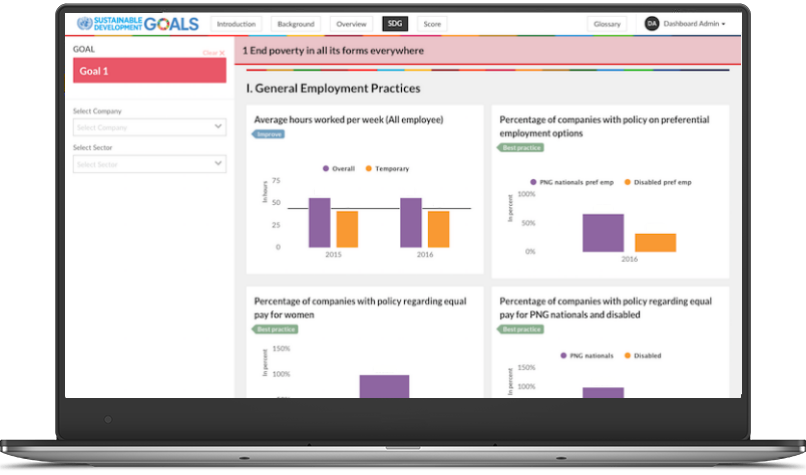
Case study

Case study
The United Nations Development Programme and the Business Council of Papua New Guinea came together to better understand and further catalyse business contributions to development. They partnered with us to create the #Business4SDGs Dashboard, which tracks how businesses' development work is bringing Papua New Guinea closer to achieving the Sustainable Development Goals.

United Nations Development Programme

Business Council of Papua New Guinea
Business
Papua New Guinea
In 2015, Papua New Guinea fell short on achieving all of the Millennium Development Goals. Almost 40% of the country's population lives below the poverty line, 87% is not connected to the electricity grid, and 60% do not have access to clean water.
One of the reasons identified for not achieving the MDGs was low involvement and partnership with the private sector. Businesses play a significant role in the Papua New Guinea's development, investing substantial resources into CSR initiatives and inclusive business practices. Because of their reach and scale, businesses are critical to achieving the Sustainable Development Goals.
However, their efforts are disconnected — planned and executed independently by each business — and there isn't a common platform for coordinating and pooling knowledge. This makes it hard for businesses to collaborate with one another, sync their efforts with other development initiatives, and increase their impact.
Businesses are the biggest driver of poverty reduction... By harnessing their strength to create employment, wealth and solutions to local and global challenges, we will go a long way to achieving the SDGs.
Former Resident Coordinator
UN, Papua New GuineaThe UNDP and Business Council of Papua New Guinea partnered with us to create the #Business4SDGs Data Intelligence Dashboard. This dashboard tracks and monitors business initiatives and maps them against progress towards achieving the Sustainable Development Goals.
On this dashboard, businesses can measure and track the impact of their work, the government can monitor diverse business efforts, and researchers can draw on its data to measure the value created from business-led development efforts.

National development data
Key development metrics track how Papua New Guinea has progressed since its independence in 1975.
Business-level survey data
Granular survey data highlights businesses' internal sustainability practices, mapped back to the SDG framework.
Sustainability Scores
Each business receives a Sustainability Score, which assesses how effectively its work is contributing to each of the SDGs.
To create a complete picture of the country's development history, we first aggregated and merged cross-sectoral development data since 1975.
We did extensive research on PNG's development interlinkages to map government expenditure to development outcomes to indivdiual SDGs.
After multiple visits and stakeholder interviews, we created sector-specific questionnaires on companies' sustainability practices.
We surveyed six leading companies in Papua New Guinea, collecting granular data on internal practices and CSR initiatives.
After mapping questionnaire data to the SDGs, we created the Sustainability Score to quantify each company's contribution to each SDG.
Our data dashboard makes it simple for businesses to monitor development metrics, company-level data, Sustainability Scores, and more.
This a global first, Papua New Guinea is leading the way in designing a methodology that maps private sector contributions to sustainable and inclusive growth in Papua New Guinea.
President
Business Council of Papua New GuineaClicking on any Sustainable Development Goal highlights how this goal is crucial to achieving other goals.
Businesses can analyze important development indicators and track how they have changed in the past 40 years.
Layering government expenditure and development indicators highlights geographies that need the most help.
Survey data gives recommendations for how businesses could accelerate SDG progress.
Each business has a Sustainability Score, which shows how much its work is contributing to each SDG.
Working with SocialCops has brought a wealth of cutting edge data analytics and software engineering to PNG, epitomising South-South partnerships and knowledge sharing. They have worked around the clock to prepare this dashboard in record time and I am very proud of the result.
Former Resident Coordinator
UN, Papua New GuineaHeader photo Ⓒ Kim Allen/UNDP (PNG)